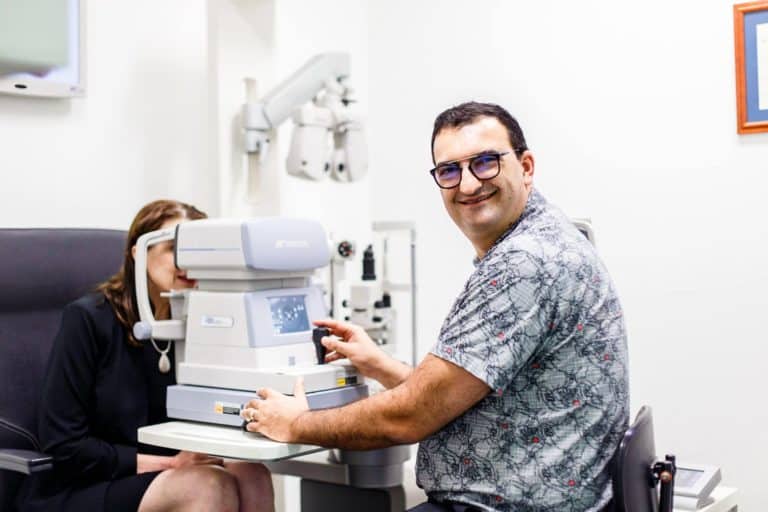When discussing eye care, many individuals frequently ask themselves, “Is a referral necessary to consult with a behavioral optometrist?”
You may also be curious about questions like “What symptoms indicate I should visit a behavioral optometrist?”, “How can I select the perfect practitioner for my needs?”, and “What can I expect during my appointment?”
Whether you’re facing vision-related issues or are simply eager to improve your visual performance, comprehending how to access behavioral optometry services is of utmost importance. Let’s delve into this subject thoroughly and clarify any queries you might have.

Understanding the Referral Process for Behavioral Optometry Services
To directly address the main concern: In most situations, you DO NOT require a referral to book an appointment with a behavioral optometrist. Behavioral optometrists serve as primary eye care providers, allowing you to schedule a visit directly without needing to consult another healthcare professional beforehand.
However, there are specific scenarios that may necessitate a referral for enhanced care:
Integrated care approach: If you are currently undergoing treatment for related issues (such as learning disabilities or neurological conditions), your healthcare provider might refer you to a behavioral optometrist as part of a comprehensive treatment plan.
Complex cases: For individuals with intricate medical histories or particular eye conditions, a general optometrist or ophthalmologist might recommend a behavioral optometrist for specialized care tailored to your unique needs.
Although these situations exist, they are not common. The majority of individuals can independently choose to see a behavioral optometrist without needing a formal referral.
At Eyes by Design, we are delighted to accept both direct appointments and referrals, making it simple for anyone in need of our specialized services to access the care they deserve.
Identifying the Right Time to Consult a Behavioral Optometrist
Recognizing when to seek the expertise of a behavioral optometrist is critical. Although referrals are often unnecessary, it’s essential to be aware of the signs that suggest you may benefit from behavioral optometry services. Consider scheduling an appointment if you or your child experience:
- Persistent reading challenges: Difficulty with reading speed, comprehension, or frequently losing your place while reading may indicate a need for professional assistance.
- Eye strain or headaches: These symptoms often occur during close-up tasks, such as reading or using a computer, suggesting potential underlying issues that need evaluation.
- Poor sports performance: Challenges in judging distances or tracking moving objects could indicate the need for a behavioral optometrist’s specialized assistance.
- Attention and concentration difficulties: Struggling to maintain focus on visual tasks or easily getting distracted might signal the necessity for specialized care.
- Coordination issues: Difficulties with hand-eye coordination or general clumsiness can be effectively addressed through behavioral optometry interventions.
- Visual discomfort post-screen time: Experiencing fatigue, blurred vision, or discomfort after using digital devices is a common concern that warrants professional attention.
- Learning difficulties: If a child is struggling academically despite having normal intelligence and putting in effort, it’s worth considering a behavioral optometry assessment.
- History of head injury or concussion: If visual symptoms persist following head trauma, seeking expert evaluation is essential to ensure proper care.
- Diagnosed with dyslexia or ADHD: These conditions are often linked with visual processing challenges that a behavioral optometrist can help address effectively.
- Symptoms persist despite normal eye exams: If standard optometry has not resolved your visual concerns, further assessment may be necessary to uncover underlying issues.
- Career-specific visual demands: Professions requiring exceptional visual skills, such as pilots, athletes, or surgeons, may necessitate a consult with a behavioral optometrist.
- Developmental concerns: For children who may be lagging in visual-motor skills, early intervention can provide significant benefits in their development.
It’s important to remember that you do not have to wait for a referral to address these issues. If you resonate with any of these signs, feel free to reach out to a behavioral optometrist, such as myself, at Eyes by Design for a comprehensive eye evaluation.
Empowering Yourself in Eye Care: The Importance of Self-Advocacy
While referrals are generally not needed for behavioral optometry, the concept of self-advocacy in eye care is crucial. As a patient, you hold both the right and responsibility to pursue the care that effectively meets your visual needs. Here’s why self-advocacy is vital:
- Personalized care: You are most aware of your symptoms and concerns. By proactively seeking specialized care, you can ensure that your specific needs are met and addressed adequately.
- Timely intervention: Waiting for a referral can lead to unnecessary delays in receiving treatment. Self-advocacy allows you to access essential care more quickly.
- Comprehensive approach: Behavioral optometrists provide a holistic perspective on vision care that encompasses much more than a standard eye exam might cover.
- Empowerment: Taking charge of your eye health decisions fosters greater engagement in your overall healthcare journey and promotes better outcomes.
- Awareness: By researching and selecting a behavioral optometrist, you become more informed about the various options available for maintaining your visual health.
- Preventive care: It’s essential not to wait for vision issues to escalate. Proactively visiting a behavioral optometrist can help identify potential problems early on, allowing for timely intervention.
At Eyes by Design, we encourage our patients to take an active role in their vision health. If you believe that behavioral optometry could be beneficial for you, please don’t hesitate to reach out directly. We are here to support your journey toward optimal visual health and performance.

Essential Factors to Consider When Selecting Your Ideal Behavioral Optometrist
Since a referral is typically not required, the responsibility of finding the right behavioral optometrist falls on you. Here are several key factors to consider in your search:
- Credentials: Ensure that the optometrist possesses specific training and certification in behavioral optometry to provide the best care.
- Experience: Look for a practitioner with a proven track record of successfully treating your specific concerns and challenges.
- Technology: Choose a practice that utilizes the latest technology for assessments and treatments, ensuring the highest standard of care available.
- Approach: Seek an optometrist whose treatment philosophy aligns with your personal healthcare beliefs and objectives, creating a comfortable environment.
- Communication style: Select a practitioner who communicates clearly and listens attentively to your concerns, fostering an open dialogue.
- Location and accessibility: Consider the convenience of the practice’s location and the availability of office hours to fit your schedule.
- Patient reviews: Read testimonials or ask for references from current patients to assess the quality of care provided by the optometrist.
- Medicare, Health Insurance, and Costs: Be aware of what services are covered by Medicare and your health insurance, along with any potential out-of-pocket expenses.
- Specialisations: Some behavioral optometrists may focus on specific areas such as pediatrics or sports vision, which could be relevant to your unique needs.
- Collaborative care: If you have other health concerns, choose an optometrist willing to collaborate with your other healthcare providers for a comprehensive approach.
At Eyes by Design, we strive to meet all these criteria by offering expert care, advanced technology, and a patient-centered approach. We encourage prospective patients to ask questions and ensure they feel comfortable before scheduling an appointment.
Preparing for Your First Visit to a Behavioral Optometrist: What to Expect
Understanding what to expect during your first visit can help alleviate any anxieties you may have about the experience. Here’s a typical process you can anticipate at Eyes by Design:
- Comprehensive history: We’ll discuss your visual concerns, overall health, and lifestyle factors that may influence your vision, ensuring a thorough understanding.
- Standard eye exam: This includes tests for visual acuity, refraction assessments, and evaluations of overall eye health to establish a baseline.
- Specialized testing: We’ll assess various aspects of visual function, including eye teaming, tracking, and focusing abilities to identify any challenges.
- Functional vision evaluation: This may include tests designed to simulate real-world visual tasks, providing insights into your daily visual functioning.
- Visual processing assessment: We’ll evaluate how your brain interprets visual information, which is essential for effective vision and understanding.
- Discussion of findings: We’ll explain our observations and how they relate to your specific symptoms or concerns, ensuring clarity.
- Treatment recommendations: Based on our findings, we’ll propose a personalized treatment plan tailored to your needs, ensuring a collaborative approach.
- Questions and answers: We welcome your questions and encourage you to share any concerns regarding our findings or recommendations, fostering an open dialogue.
- Next steps: We’ll outline the proposed treatment process and schedule follow-up appointments if necessary, ensuring you’re informed every step of the way.
Remember, this process is not solely about assessing your eye health; it’s also about enhancing your overall visual performance and enriching your quality of life. Come prepared with questions and be ready to actively engage in your care for the best outcomes.
Understanding the Critical Role of Behavioral Optometry in Your Overall Health
Behavioral optometry serves a vital role in your overall health and well-being in multiple ways:
- Cognitive function: Clear vision is essential for effective learning and information processing, influencing educational outcomes.
- Physical health: Vision problems can lead to poor posture and physical strain, impacting overall health and wellness.
- Mental health: Vision difficulties can result in heightened anxiety and diminished self-esteem, affecting emotional well-being.
- Productivity: Optimal visual function is critical for both work and academic performance, influencing success in various aspects of life.
- Quality of life: Achieving clear, comfortable vision enhances enjoyment of daily activities and social interactions, improving life satisfaction.
- Safety: Good vision and effective visual processing are essential for safe activities, such as driving and navigating environments.
- Social interaction: Visual cues are crucial for non-verbal communication, influencing interpersonal relationships and social skills.
- Preventive care: Early intervention can prevent the progression of vision issues, safeguarding your long-term health.
By addressing visual function comprehensively, behavioral optometrists significantly contribute to your overall health and well-being. This holistic approach emphasizes the importance of seeking specialized care whenever necessary, regardless of whether a referral is involved.
Effective Strategies for Accessing Behavioral Optometry Services
While a referral is generally not required to consult a behavioral optometrist, understanding when and how to access this specialized care is essential. At Eyes by Design, we are dedicated to providing accessible, comprehensive vision care that goes beyond standard eye exams.
Whether you are experiencing specific visual challenges or simply wish to enhance your visual performance, do not let the absence of a referral deter you from seeking assistance. Take charge of your visual health by directly contacting a qualified behavioral optometrist.
Your vision impacts every aspect of your life. By choosing behavioral optometry, you are making a significant investment in your overall well-being and quality of life.
We encourage you to listen to your body, recognize the signs that indicate you may need specialized care, and take proactive steps towards achieving optimal visual health.
If you have any questions or would like to schedule a routine eye exam, please do not hesitate to contact us at Eyes by Design. Your journey to improved vision commences here.
This article aims to enhance understanding and knowledge about general eye health topics.
It should not replace professional advice, diagnosis, or treatment.
Always consult your healthcare professional before incorporating this information into your health regimen.
Dr Nicholas Altuneg
For over two decades, my greatest passion has been helping people of all ages live improved lives through better vision. At Eyes by Design, vision is so much more than simply seeing clearly or reading small letters from a distance; it fundamentally shapes your perceptions and reactions every moment of your day.
Read more about Dr Nick
Do You Need a Referral to See a Behavioural Optometrist? Everything You Need to Know
The Article: Referral to See a Behavioural Optometrist: Key Insights first appeared on https://writebuff.com.





I really appreciate your exploration of behavioral optometry and the common misconceptions surrounding it, especially the need for referrals. As someone who has personally benefited from seeing a behavioral optometrist, I can relate to the confusion many feel when navigating eye care options. When I first considered consulting one, I was unsure if I could just call up and make an appointment or if I needed to jump through hoops first. It’s liberating to learn that one doesn’t necessarily need a referral, which can often act as a barrier to access for those experiencing vision challenges.
It’s great to hear your perspective on this topic. The journey to finding the right eye care can definitely be confusing, especially with the varying types of specialists. The perception that you need a referral can really create barriers for many seeking help.
It really is a complicated landscape, isn’t it? The varying types of eye care specialists can leave many feeling overwhelmed. I’ve experienced that confusion myself—one time I thought I was making a simple appointment for an eye exam, only to find out I needed to see a specialist for my particular issues. The lack of clarity around referrals certainly adds another layer of stress.
It’s great to hear that your experience with behavioral optometry has been positive and that you can resonate with the confusion many face. The journey towards understanding different eye care options can be quite daunting, especially with varying opinions about what’s necessary for a consultation.
I completely relate to the feeling of confusion when it comes to eye care options. It’s fascinating how personal experiences shape our understanding of something as essential as vision. I found that many people don’t realize how different approaches, like behavioral optometry, can truly impact not just eyesight but also overall cognitive function and day-to-day life.
You raise a great point about how personal experiences can steer our understanding of eye care. It’s interesting how a lot of us don’t think about vision as more than just seeing clearly. I’ve come across behavioral optometry as well, and it’s a whole different take on how we approach eye health.
I really resonate with your thoughts on the confusion surrounding eye care options. It’s surprising how often people overlook how nuanced vision can be—there’s much more than meets the eye. Behavioral optometry is an interesting approach, not only for vision correction but also in the way it recognizes the connection between sight and cognitive function.
You bring up a great point about how personal experiences really shape our views on eye care. It’s interesting how something like behavioral optometry can be overlooked. I’ve seen folks who’ve gone through those types of therapies and have such a noticeable shift, not just in vision but in how they carry themselves in daily life. It’s almost like unlocking a part of how they process everything around them.
It’s great to hear about your positive experience with a behavioral optometrist. The confusion around referrals can really clutter the path for those seeking help. It’s surprising how many people think they need to navigate a complicated process to get the eye care they need when, in reality, the direct route is just a call away.
It’s great to hear about your positive experience with a behavioral optometrist. Your journey highlights a common concern many have when looking for specialized care. The idea of needing a referral can definitely complicate things, especially when you’re already navigating the challenges of vision issues.
It’s interesting to hear that you relate to the referral challenge. Finding the right specialist can feel like navigating a maze, especially when you’re already dealing with vision challenges. I found that doing a bit of upfront research helped ease the process—like looking for behavioral optometrists who focus on specific needs or local recommendations. It’s all about connecting with someone who understands your unique situation, and sometimes those personal stories can lead to finding the right fit. Have you encountered any specific obstacles while looking for specialized care?
I’m glad you found the article meaningful! It’s definitely a journey to navigate through eye care options, especially when the processes aren’t always clear. Your experience highlights an important point: the ability to reach out directly to a behavioral optometrist can be a game changer for many.